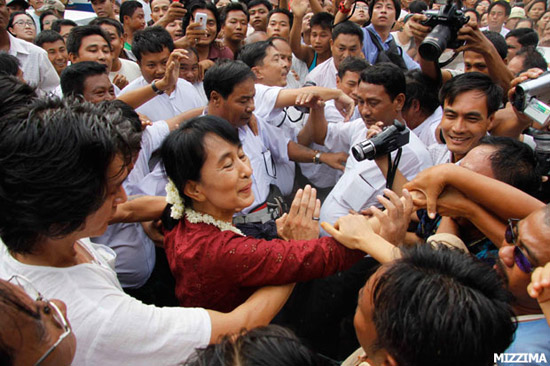Kawhmu Township on the edge of Rangoon will have the historic honour of electing Aung San Suu Kyi a member of the Burmese Parliament on April 1. A spokesman for the National League of Democracy officially confirmed her candidacy on Tuesday.
 Suu Kyi will be one of 48 NLD candidates seeking to become members of Parliament in the upcoming by-election. Even if all 48 NLD candidates should win – which is a long shot, but possible – the NLD and other opposition political parties will still be only a tiny fraction of the 664 lawmakers. The ruling Union Solidarity and Development Party will vastly overshadow opposition lawmakers.
Suu Kyi will be one of 48 NLD candidates seeking to become members of Parliament in the upcoming by-election. Even if all 48 NLD candidates should win – which is a long shot, but possible – the NLD and other opposition political parties will still be only a tiny fraction of the 664 lawmakers. The ruling Union Solidarity and Development Party will vastly overshadow opposition lawmakers.
However, the NLD is likely to become overnight the opposition party with the largest number of seats, and many smaller parties will quickly gravitate to the NLD for leadership and consensus on strategic issues. In the future, we expect to see many smaller parties disappear and join the NLD.
What will it mean to have Aung San Suu Kyi in Burma’s Parliament?
She will, in effect, become the shadow president of Burma, as illustrated by the continuing flow of high-level western government officials to her doorstep, eager for a picture opportunity with one of the world’s most well-known heroines of the struggle for democracy. As the opposition leader, she will have the change to focus debates, even if she does not have to the votes to win on the key issues. Also expect other NLD lawmakers to assume portfolios as shadow justice minister, finance minister environmental minister and so on. Expect the media to move toward those NLD leaders like magnets, eager to hear their response to government policies, debates; expect to see the media filled with more informed news, commentary and opinion, if the media reforms continue toward more freedom of speech and the press.
Certainly, expect to see some high-level behind-the-scenes wheeling and dealing. If nothing else, Suu Kyi is a student of the big picture, she understands how slowly – or fast – change can occur. She well knows the issues that will lead to national reconciliation, and those will become her constant focus moving forward. She has a vast reservoir of goodwill, which by all accounts exists even in some official governmental and military circles, which rightly see her as a willing alley in smoothing the way for the government – the nation – to obtain the legitimacy it wants.
An adviser to President Thein Sein said recently that one day the NLD party could rule Burma. Of course, he’s right. The question is only how fast that day will come, barring the unforeseen step backwards into military repression. But each new day that passes without backsliding signals progress forward, no matter how slowly, and the bad old days are less likely to return.
When Suu Kyi stands up in Parliament and delivers her first speech sometime in May this year, a fresh Spring will have arrived in Burma, the world will listen to her words.
Only fourteen months ago, she was under house arrest. In a short span of time, she has met with the country’s president, with whom she appears to have forged an unspoken understanding that they will work together to push the government toward national reconciliation.
Long ago, she forged an understanding with the Burmese people that she would try to lead them forward. Now she will do it in Parliament.



